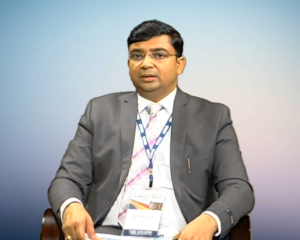
…it will improve quality, delivery – ICT innovator
Technological innovation is changing the way that students learn and universities teach, and with an influx of new learning models available, traditional educational methods are bound to evolve in the next decade. As such, Guyana should make use of technology to advance education.
This is the advice of District Magistrate in the Indian State of Bihar, Kundan Kumar, who was in Guyana for the Commonwealth Association for Public Administration and Management (CAPAM) biennial conference, which was held at the Marriott Hotel between October 22 and 24.
Kumar, who led a team from India here, competed in the CAPAM competition. Their project, the Unnayan Banka, won the Reinventing Education using Technology category. The programme, an interactive online and offline study method, was nominated by the Government of India.
The Indian national said the State of Bihar’s Banka district has re-invented the meaning of ‘smart classroom’ with the introduction of this new technology-based learning app, alongside continuous monitoring of students through a centralised tracking system.
He said the initiative is an employment generator while also creating a virtual classroom for subscribers. According to Kumar, technology can be an enabler in providing solutions to problems in classrooms, and has proven to be successful in many areas.
In explaining how the model is working in India, he said most of the students belong to tribal communities and have been deprived of quality education for years. The initiative has created hopes in the students and their families to excel in academics and provide much needed support to their families.
The programme, he said, began in August 2017 with 5 schools, and was for students of Class 12. It has now expanded to include 143 schools in the district. According to a report by the Indian Express, the programme has further expanded to facilitate smart class facilities for Class 9 students as well.
From Monday to Saturday, the students of 143 schools in Bihar’s Banka district are made to watch short audio-visuals in social studies, science and maths for an hour-and-a-half every day. The topics of these short audio-visuals are chosen from the curriculum. During these sessions, the students are encouraged to take notes as they watch the videos.
Towards the end of each day, a sheet with five questions each from three subjects is given to the students. These sheets are then evaluated by the students themselves with the help of the teacher in charge. Students evaluate each other’s work and upload the daily results on the app.
The progress of the students can be monitored by parents, students and administration officials through the app itself. Kumar further said, “The centralised uploading of marks gives us a clear idea of how students have been faring in these three subjects, and also tells which school or area in the district needs intervention.”
With the use of this technology, the Indian District Magistrate posited, Guyana can use ICT to advance teaching.
“There are many constraints that crop into providing quality education to everyone…but technology is a great enable, (and) can provide many solutions to problems such as teachers’ absenteeism, low learning capacity, and assessment etc.” he added.
Kumar said Guyana can become an entire virtual classroom with the use of technology wherein people in the most remote part of Guyana can have access to education through technology.
“It is changing the landscape of education. It also reduces the barrier of getting an education, getting good quality education and good outcomes. It is very much needed,” he recommended.
He noted that both private and public sectors approve that technological innovations will continue to have major effects on teaching approaches over the coming years.
“Certainly it will be a core differentiator in attracting corporate partners and students in academic institutions.”
Distance learning and online programmes are gradually gaining a firm foothold in academic institutions all over the world, including right here at the University of Guyana and the National Center for Educational Resource Development (NCERD), among other places.



